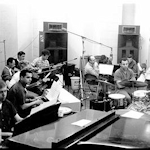
"The Wrecking Crew" was a highly talented and influential group of session musicians who played a significant role in shaping the sound of popular music during the 1960s and 1970s. Based primarily in Los Angeles, California, this collective of musicians was known for their versatility, technical skill, and ability to adapt to a wide range of musical styles.
The Wrecking Crew comprised a rotating roster of musicians, but some of the core members over the years included guitarists Tommy Tedesco, James Burton and Glen Campbell; bassists Carol Kaye and Larry Knechtel; drummers Hal Blaine, Jim Gordon, Jim Keltner and Joe Porcaro; keyboardists Mac Rebennack (Dr. John), Leon Russell and Larry Knechtel; saxophonists Plas Johnson and Jim Horn; and many others. These individuals were seasoned professionals who had honed their craft through years of performing and recording.
The group emerged at a time when record labels and producers sought to maximize efficiency and productivity in the recording process. Rather than relying solely on the artists themselves to record their songs, the practice of using session musicians became more prevalent. The Wrecking Crew quickly gained a reputation for their exceptional musicianship, adaptability, and ability to deliver high-quality recordings in a short amount of time.
Members of The Wrecking Crew contributed to a vast number of hit songs and albums across various genres. They worked with renowned artists such as The Beach Boys, Elvis Presley, The Mamas & the Papas, Simon & Garfunkel, Frank Sinatra, The Monkees, The Byrds, The Righteous Brothers, and many others. They played on numerous iconic tracks, including "Good Vibrations" by The Beach Boys, "California Dreamin'" by The Mamas & the Papas, and "Mrs. Robinson" by Simon & Garfunkel, to name just a few.
Their skills extended beyond traditional rock and pop music, as they also played on numerous film and television soundtracks, including those for popular TV shows like "Mission: Impossible" and "M*A*S*H." The Wrecking Crew's contributions can be heard on countless classic recordings from the 1960s and 1970s, making them an integral part of the "California Sound" and the overall development of popular music during that era.
Despite their significant contributions to the music industry, The Wrecking Crew often worked behind the scenes, with their names not appearing on album covers or receiving proper credit for their performances. This practice was common in the session musician world at the time. It wasn't until later years that their contributions were more widely recognized, and documentaries such as "The Wrecking Crew" (2008) shed light on their work and celebrated their immense talent.
The legacy of The Wrecking Crew continues to inspire musicians and music lovers to this day. Their collective impact on the sound of popular music cannot be overstated, as they played an essential role in shaping the musical landscape of the 1960s and 1970s, leaving an indelible mark on countless recordings that have stood the test of time.
